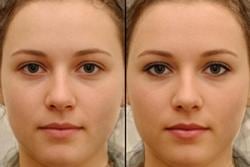The study, carried out at Wales-based Bangor University in the United Kingdom, specifically examined make-up use and found that when reporting their own preferences, men found women's faces more attractive when they were wearing less make-up, up to 40% less than the actual amount worn.
Additionally, women in the study shared very similar ideas, indicating that other women look more attractive with less make-up.
According to Dr Alex Jones of the School of Psychology; “The take-home message from this study is that our ideas about what the opposite sex find attractive are often inaccurate, whether it relates to body size, weight, or even something like make-up use.”
“The misconceptions play a role in body image and self esteem issues and are sadly based on simple misunderstandings,” he adds.
Misconception of what's beautiful
The researchers gave 44 women different types of foundation, lipstick, blush and mascara and then told them to put on makeup like they were going on a night out.
The women were then photographed before and after, with the researchers then altering the photographs so they had a range of 21 images of the women wearing various amounts of makeup.
The images were then shown to 44 Bangor University students, who were told to pick the photo that they thought

was the most attractive, and then the photo they thought women would prefer and the photo men would prefer.
"Interestingly, the women liked images of the models wearing a bit more make-up than the men did," says Dr. Jones.
All of the participants assumed men would like the models with more make-up on than the women would, but that turned out to be untrue. Men and women both preferred the images of the models wearing 40% less make-up than they initially put on.
The researchers concluded that women are putting on make-up for a perceived standard of beauty that may not actually exist. “Taken together, these results suggest that women are likely wearing cosmetics to appeal to the mistaken preferences of others."
The PhD was funded through the Knowledge Economy Skills Scholarships (KESS) Programme. KESS is a major European Social Funds (ESF), European Convergence programme led by Bangor University on behalf of the HE sector in Wales.
Jones, A. L., Kramer, R. S. S., & Ward., R. (in press). Misattributions in judgements of attractiveness with cosmetics. Quarterly Journal of Experimental Psychology
